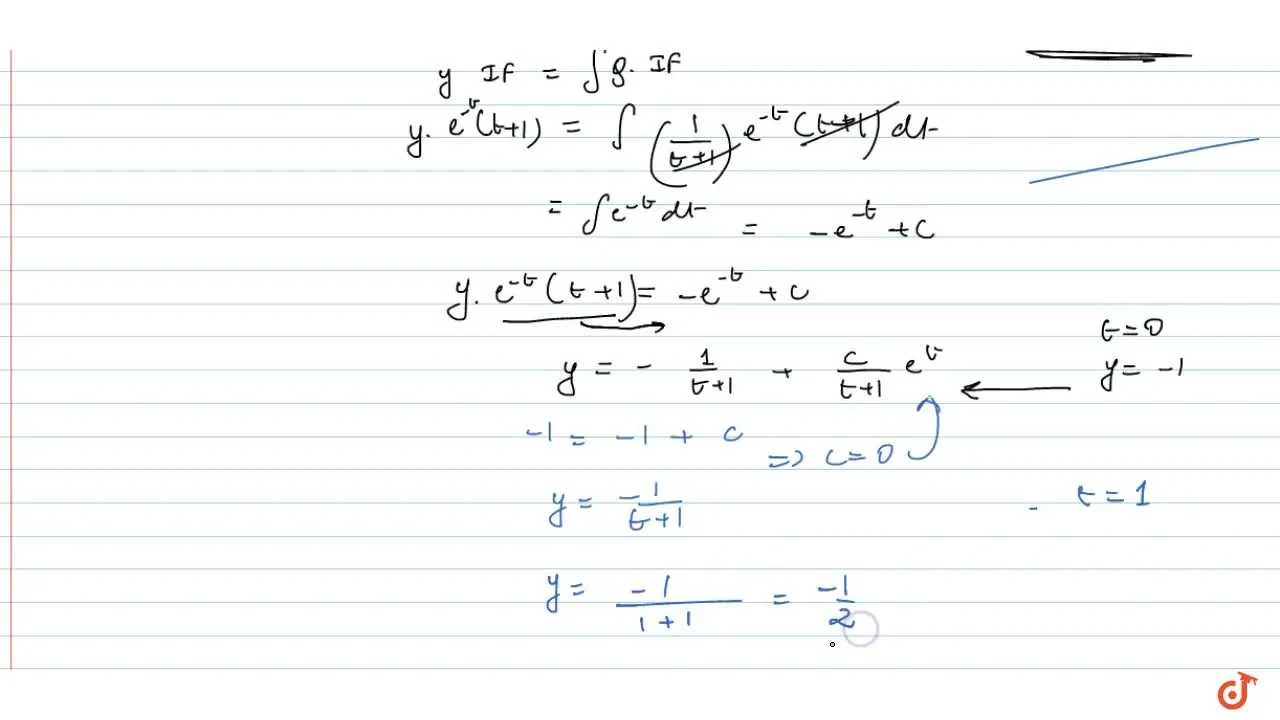If is a solution of then show that
Video Solution
Text Solution
Here, $$\frac{d y}{d t}-\left(\frac{t}{1+t}\right) y=\frac{1}{1+t}$$ and $$y(0)=-1$$ which represents linear differential equation of first order. $$ \begin{aligned} &I F=e^{-\int\left(\frac{t}{1+t}\right) d t}=e^{-\int \frac{(t+1+1)}{1+t} d} \\ &=e^{-t-\log (1-t)} \\ &=e^{-1}(1+t) \end{aligned} $$ Required solution is $$y(\mathbb{I F})=\left[\int Q \cdot(\mathbb{I F}) d t\right]+C$$ $$ \begin{aligned} &y^{-1}(1+t)=\int \frac{1}{1+t} e^{-1}(1+t) d t+C \\ &=\int e^{-t} d t+C=e^{-t}+C \\ &\text { At } t=0, y=-1 \end{aligned} $$ Therefore, $$-1(1+0)=-\mathrm{e}^{0}+\mathrm{C}$$ $$ \Rightarrow \mathrm{C}=0 $$ Therefore, $$y^{-1}(1+t)=-e^{-t}$$ $$\mathrm{Att}=1$$ $$y \mathrm{e}^{-1}(1+1)=-\mathrm{e}^{-1}$$ $$ \Rightarrow y=-\frac{1}{2} $$
|
Updated on:21/07/2023
Related Playlists
Similar Questions
If y(t) is a solution of (1+t)dydt−ty=1andy(0)=−1 then show that y(1)=−12.
View SolutionIf y(t) is a solution of (1+t)dydt−ty=1 and y(0)=−1 then y(1) is
View SolutionIf y(t) is a solution of (1+t)dydt−ty+1=0andy(0)=1, then : y(1)=…
View SolutionIf y(t) is solution of (t+1)dydx−ty=1,y(0)=−1 then y(1)=
View SolutionIf y(t) is the solution of (1+t)dydt−ty=1 and y(0)=−1 then absolute value of y(1) is equal to
View SolutionIf y(t) is solution of (t+1)dydt−ty=1,y(0)=−1. At t = 1 the solution is
View SolutionIf x=log(1+t2),y=t−tan−1t, show that dydx=√ex−12
View SolutionIf x=tet and y=1+logt, find dydx
View SolutionIf x=a(t−1t),y=a(t+1t),show that dydx=xy
View Solutionif x=1+lntt2 and y=3+2lntt then show that ydydx=2x(dydx)2+1
View Solution


